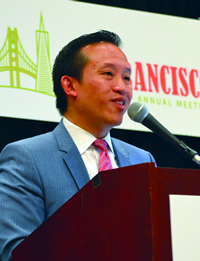As the ACR works on the federal level to address the high costs of specialty drugs, the speaker at Saturday morning’s 2015 Legislative Update made it clear that this is a state issue, as well.

California Assemblyman David Chiu, D-San Francisco, detailed his attempt to pass price-transparency legislation in his home state. Chiu has sponsored legislation that would require makers of high-priced specialty drugs, those costing at least $10,000 a year, to divulge how much they spent on research and development for the drug. The bill would also require disclosure of how much federal money they received to develop the drug and how much they spent marketing it.
“That would give us more of a sense of fairness in how we talk about prices,” Chiu said.
He said he was making progress in getting the bill through the health committee but has encountered opposition from big pharmaceutical companies.
On the federal level, ACR is a proponent of the Patients’ Access to Treatment Act, which would stop the insurance industry practice of replacing fixed-cost co-pays with percentage charges when it comes to specialty drugs, including biologics.
Chiu cautioned against pinning the responsibility on insurers. Ending these “specialty tiers” would likely just result in the insurance companies passing on the costs to consumers in the form of higher premiums, he said.
The issue has come to a head in California because of the state cost in paying for the new hepatitis C drugs for patients on state assistance. He said the state had to add up to $300 million to its budget to help cover those costs.
“This issue threatens to swallow up our budget,” Chiu said.
Though he has found many allies for his cause, including business and labor groups, the assemblyman said doctors have stayed on the sidelines. He said that is also the case nationally with the American Medical Association.
With the trust they enjoy from the public, Chiu said, it’s important that physicians get involved with the debate.
The issue is not going to go away, he said, noting that Democratic presidential candidates Bernie Sanders and Hillary Clinton have proposals to address the high cost of prescription drugs.
“This is going to be front and center,” he said.
Given its size, Chiu noted that California often leads the nation in public policy, including on health care issues. He noted recent controversies in California that could make their way to other states.
In July, Gov. Jerry Brown signed into law what some have called the strictest school-vaccination requirement in the country.
The bill requires all children enrolled in public or private schools or daycares to be vaccinated against whooping cough, measles and other diseases, regardless of parents’ religious and other personal beliefs. A December measles outbreak that started at Disney theme parks in California spurred passage of the bill.
He also noted his efforts to require that crisis-pregnancy centers, which he said are often operated by pro-life groups, disclose to patients when staffers wearing white medical coats are not doctors.
Chiu also highlighted California’s “right-to-die” law enacted last month.
He also championed his successful effort to require that state agencies add sexual orientation and gender identity to the voluntary information it collects from residents. That is an important step, Chiu said, in public health efforts regarding the transgender population.


